As preparations for the Olympics gather pace, India may be headed for yet another paltry medal haul, says Dhruv Munjal.
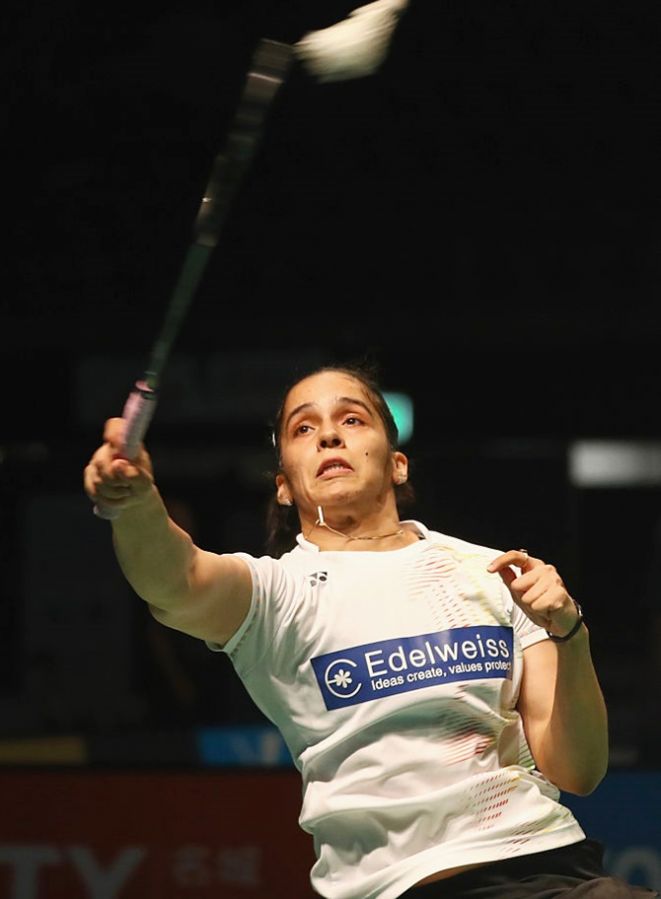
Late last week in Jakarta, Saina Nehwal joyously thrilled and then imploded. Carolina Marin, the spunky 22 year old from Spain, is an onerous opponent: Gumption and physicality in plenty, and to go with it, rasping grunts that make you feel like you're up against Maria Sharapova on a badminton court.
The match oscillated tantalisingly in the first game, with Nehwal effectively combating the World No 1's all-round game but coming up agonisingly short. The second was like a smacking hurricane that left Nehwal severely bruised, and her confidence, unmistakably dented. The 22-24, 11-21 loss confirmed Nehwal's quarter-final exit from the Indonesia Open Super Series.
Before heading off to Jakarta, Vimal Kumar, Nehwal's coach, spoke about how a strong performance in Indonesia would help 'her get an easier draw for the Rio Olympics.' Comfortable draw or not, even Kumar, in his genial manner would deep down acknowledge that Nehwal's chances look grim -- she would have to fast track preparation and go on one of those irrepressible runs that dumps every opponent by the wayside.
The chances, however, are that someone will withstand the storm and knock her down.
Nehwal's loss of form in the last one year has been startling. Crippled by injuries, the 26 year old has seen her ranking plummet to eight in the world -- not the kind of omens you would want to entertain before a major event that comes along only once every four years.
"Nehwal was probably India's best bet for a medal. Now, that looks difficult. I wonder what kind of message this sends out to fans," says a former badminton player who represented India.
Ten medals -- that was the informal target the Indian Olympic Association had set for itself after the country won an unprecedented six medals in London four years ago. This number was level with the medals India had won in the five previous Olympic Games.
Rio de Janeiro in 2016 was expected to be the true blossoming of a sporting nation that had for so long fizzled on the world stage. Now, with little under a month to go, those hopes are being silently extinguished, chances of a serious medal haul being met with understandable scepticism.
Injuries and slumping form -- a worrying theme that cuts across almost all Indian athletes and sports. And, one has to look no further than badminton to capture that downturn.
P V Sindhu now sits on the periphery of the top 10 in the world, and Kidambi Srikanth, after famously beating the mighty Lin Dan two years ago, has somewhat fallen off the pace. Pullela Gopichand, India's badminton coach, acknowledges that injuries have been a problem in the last year but remains optimistic. "You can't do much about injuries. That's the nature of sport. But two good matches can help us win a medal."
'Matches against Australia often turn into an embarrassment'
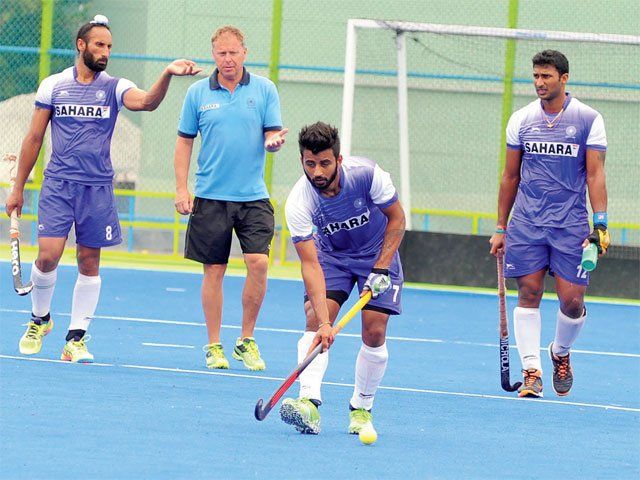
When the stone-faced Roelant Oltmans took over from Paul van Ass as coach of the national side last year, a sordid slugfest between the coaching staff and Indian hockey's inglorious administrators had just been quelled by some timely intervention.
Naturally, hockey wasn't the focus at the time. In his dual role as coach and high performance director, Oltmans has transformed an incoherent bunch of players into a sturdy, fluid unit -- the runner-up finish at the Azlan Shah Cup earlier this year and a third place at the 2015 Hockey World League Finals being telling demonstrations of that robustness.
"He is a master tactician. There are very few who are better than him," says former India captain Viren Rasquinha.
However, as sports watchers and analysts, we have an annoying habit of sensationalising the present, often abjectly failing to distinguish between the great and the middling. It is easy to get drunk on superlatives and conjure up heroes where there aren't any. We would do well to help this current Indian team escape that fate.
As Rasquinha rightly points out, the team is playing well, but a lot needs to be done. "We have to find a replacement for P Sreejesh if he gets injured. The overall defence has to improve. And the management must find a way to get Birendra Lakra fit again," he says. "So, it is very difficult to predict if the team can win a medal."
Another former player, on the condition of anonymity, sums up India's chances more bluntly. "India has failed to beat the top teams for a number of years now. Matches against Australia, for example, often turn into an embarrassment. Expecting a medal would not be right."
It is no secret that India, despite technical improvements and fitness enhancements, still struggle against the game's powerhouse teams. Defeats against Australia and The Netherlands have become an exasperating routine.
Former national coach and Olympian Joaquim Carvalho, however, feels that it's just a matter of one game. "If you reach the semi-final, then anything can happen after that. India must target that."
'It's over. I can fully focus now'
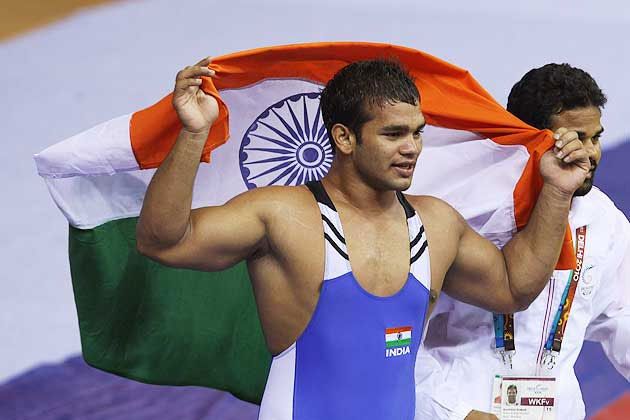
The last day of May saw Argentine football star Lionel Messi and his father appear before a Barcelona court in a $4.5 million tax fraud case. Days later, wrestler Sushil Kumar did the same -- appearing before the Delhi high court.
The difference: Sushil Kumar pleaded before the judges not his innocence, but brandished his credentials as the ideal candidate for the 74-kg category at the Rio Olympics. By then, the court had made up its mind that Narsingh Yadav -- the man who won India the qualifying berth -- would go to the Brazilian capital.
Amid this perverse fallout and frantic scramble for participation, almost everyone involved in the squabble has forgotten that there is an Olympic medal at stake.
India has won three medals in wrestling in the last two Games -- two bagged by Sushil Kumar himself. In the last few years, wrestling has become an Indian stronghold. But just two qualifiers in the men's freestyle category -- Yadav and Yogeshwar Dutt -- is a terribly poor reflection of that dominance.
Yadav, in the last few years, has developed into a tenacious grappler who so efficiently mixes power and technique. And he has podium finishes to boast: A bronze at the Worlds in Las Vegas earlier this year as well as medals at the 2014 Incheon Asian Games and the 2015 Asian Championships in Doha.
Despite all the distractions that the last few weeks have brought with them, Yadav has tried to remain in the 'zone.' "It's over. I can fully focus now. Gold is what I've been aiming for," says the Mumbai wrestler.
A former wrestler though confesses that in hindsight, Sushil Kumar may have had a better chance. "Yadav is in peak physical condition but Sushil has loads of experience. He can handle pressure well," he says. "Purely from a medal point of view, he would have had the edge."
Dangal, which is based on the lives of wrestler sisters Geeta Phogat and Babita Kumari, releases later this year. The film will see Aamir Khan play Mahavir Singh Phogat, the sisters' father who taught them wrestling.
Geeta became the first Indian woman wrestler to appear at an Olympic Games in London four years ago. Kumari will join her sister in that exclusive list this year. Vinesh Phogat -- a cousin of the Phogat sisters -- and Sakshi Malik are the other two who have miraculously turned around the relatively listless state of women's wrestling in India.
Kuldeep Malik, India's national wrestling coach, believes that the women can help India clinch two medals. He may prove to be right. With scanter competition and more candidates, the women's side -- almost unfathomably -- looks the likelier of the two to get back home a wrestling medal.
'I made technical mistakes. I've learnt from them now'
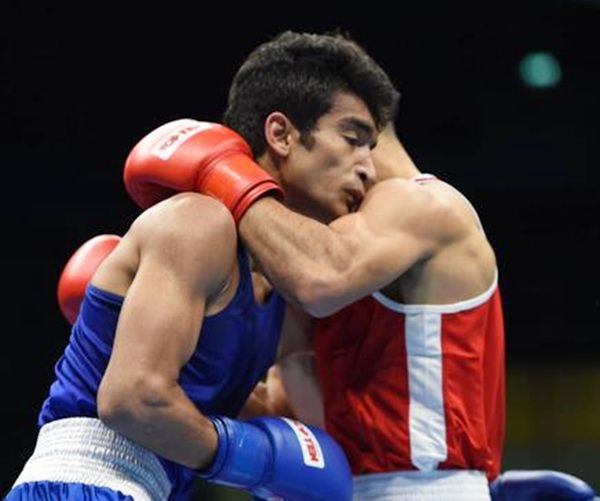
Unlike his demeanour in the ring, Shiva Thapa talks softly with long pauses. The bashful 22 year old from Guwahati is the only Indian pugilist to have qualified for the Olympics so far.
At London in 2012, Thapa, then 18, was knocked out in the first round of the bantamweight category. "I made technical mistakes. I've learnt from them now. I just plan to train hard," he says.
But between Thapa and a medal is a treacherous obstacle: Professional boxers. The International Boxing Association last month gave the green light for the participation of professionals in Rio -- a precarious proposition that comes with the potential of ending in catastrophe. The sight of fully-grown men pummelling hapless amateurs is something no one is likely to relish.
"Thapa is young but very talented. However, he will have to fight really well to win a medal," says former Commonwealth Games gold medallist Akhil Kumar. "With professionals in the fray, it won't be easy."
Vikas Krishnan and Vijender Singh have an outside chance of joining Thapa once the qualifying tournaments conclude in July.
Karmakar is training eight hours every day
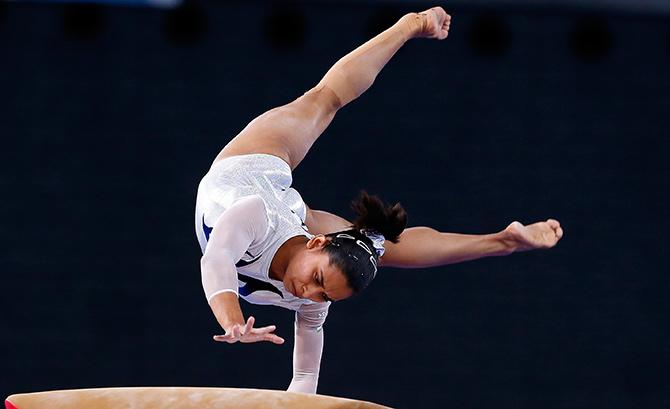
Dipa Karmakar will be the lone Indian representative in her discipline at Rio. In April, Karmakar made history by becoming the first Indian woman gymnast to qualify for the Olympics.
Karmakar is training eight hours every day and is only one of the five women in the world to have successfully landed the Produnova vault -- a dangerous manoeuvre that requires stunning athletic perfection.
At Rio, the rookie in Karmakar will face seasoned American and Russian gymnasts, as well as the Chinese, who have taken gymnastic precision to paranormal levels in the last few years.
A medal here would easily be greatest sporting performance this country has ever been witness to.
'Every time there is a multi-sporting event, we put our weight behind our tennis stars'
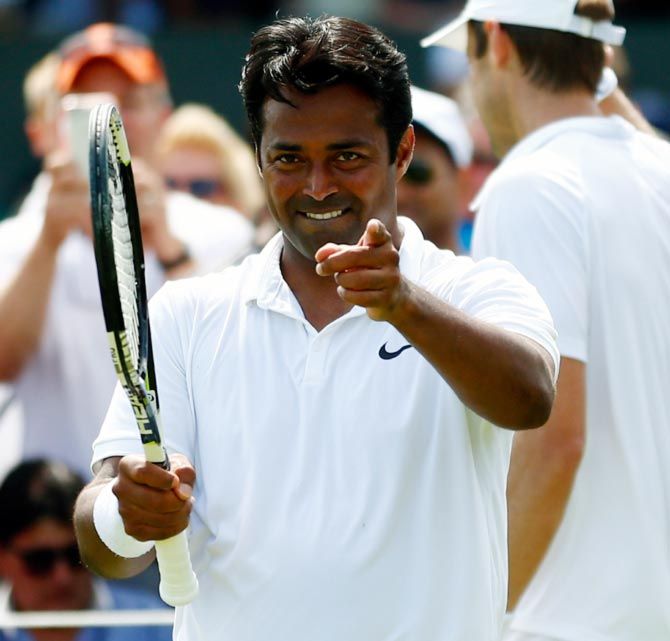
To think that Leander Paes won a singles medal at the Atlanta Games in 1996 and will feature again 20 years later is a testimony to his gigantic tennis appetite, and fitness. To think he may be one of India's better medal hopes is a damning confirmation of India's limited talent pool.
At the French Open in Paris last week, Paes tied Martina Navratilova for the most number of mixed-doubles titles in tennis history. However, due to his low world doubles ranking, Paes will miss out on playing that event with Sania Mirza in Rio. He will partner Rohan Bopanna in the men's doubles instead.
Mirza and Paes have shown scintillating form in the last year, devouring major titles for dinner. A former Davis Cup captain explains succinctly: "Every time there is a multi-sporting event, we put our weight behind our tennis stars. That's because we have a couple of genuinely world-class players. They will do well this time too."
'Narang remains a strong contender despite enduring a winless streak, ditto for Abhinav Bindra and Jitu Rai'
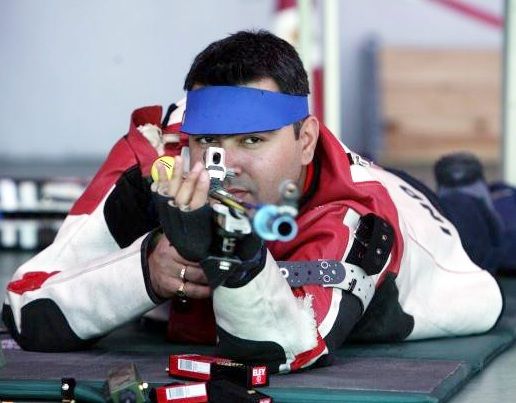 In the past, we have often backed another category of sportsmen that has seldom disappointed: India's shooters.
In the past, we have often backed another category of sportsmen that has seldom disappointed: India's shooters.
Gagan Narang has spent the last week exulting over his new gun, a Walher rifle with a lighter trigger. Narang, who won bronze in the 10 m air rifle in London, remains a strong contender despite enduring a winless streak at last month's ISSF Munich World Cup.
Ditto for Abhinav Bindra and Jitu Rai, two former world champions whose form has been patchy, but the desire to win a medal is unwavering as ever.
Among the varied cliches that will be thrown up in the coming days, 'glorious opportunity' will be used with dogged persistence. In actuality, Rio does provide a glorious opportunity for Indian athletes, but most of them will have to summon a performance for the ages to get their hands on a piece of shining metal.
Even as the chances seem bleak, sport always has a mystical propensity for surprise. In Rio, India and its athletes must believe that it will come true.












